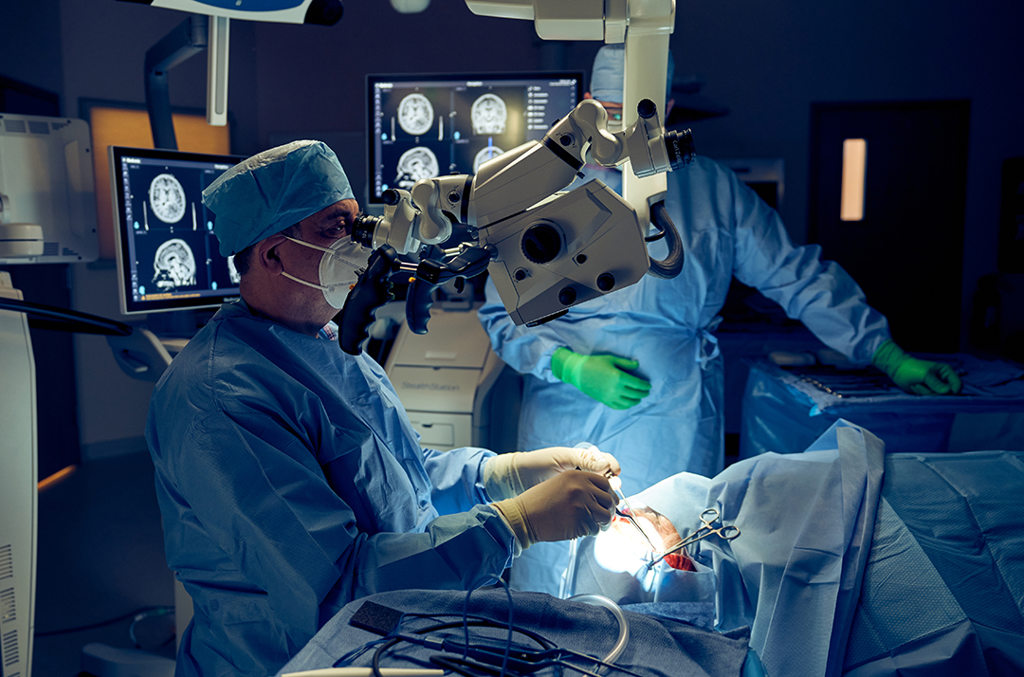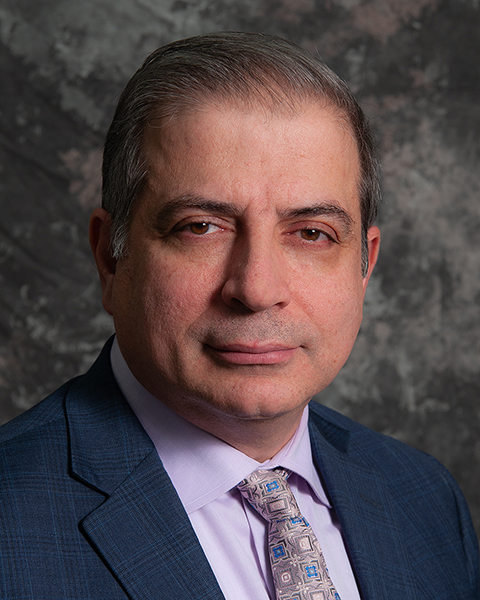
Pennsylvania Neurosurgery at Penn Highlands
Neurosurgery Care
Penn Highlands Neurosurgery with practices across Pennsylvania. Our board-certified neurosurgeons offer the most advanced treatments for brain conditions, such as brain aneurysms, and spinal conditions that cause back pain and neck pain. They also offer treatment for nerve conditions causing pain, including carpal tunnel syndrome and trigeminal neuralgia.
About Our Pennsylvania Neurosurgery Program
Penn Highlands Neurosurgery is the only neurosurgery practice in central Pennsylvania, but it is also one of the best neurosurgery programs in the state. Our board-certified neurosurgeons offer the most advanced treatments for brain conditions, such as brain aneurysms, and spinal conditions that cause back pain and neck pain. They also offer treatment for nerve conditions causing pain, including carpal tunnel syndrome and trigeminal neuralgia.
Here are just a few reasons to choose Penn Highlands Neurosurgery:
- Diagnosis and treatment provided by a world-class neurosurgery team relocated from leading Pittsburgh health systems
- Decades of experience with simple to complex brain and spine surgery
- Integrated care with Penn Highlands cancer experts for brain tumors and spine tumors
- Minimally invasive surgery when possible
- Use of high-energy radiation to treat brain tumors and spine tumors without surgery

Neurosurgery
Penn Highlands Neurosurgery - Monongahela
Penn Highlands Neurosurgery - Greensburg
Penn Highlands Neurosurgery - Chess Street
Penn Highlands Neurosurgery - DuBois
A Service of Penn Highlands DuBois

Neurosurgery
Penn Highlands Neurosurgery - DuBois
A Service of Penn Highlands DuBois

Neurosurgery
Penn Highlands Neurosurgery - Greensburg
Penn Highlands Neurosurgery - DuBois
A Service of Penn Highlands DuBois
Penn Highlands Neurosurgery - Chess Street
Penn Highlands Neurosurgery - Monongahela

Neurosurgery
Penn Highlands Neurosurgery - Greensburg
Penn Highlands Neurosurgery - Chess Street
Penn Highlands Neurosurgery - DuBois
A Service of Penn Highlands DuBois
Penn Highlands Neurosurgery - Monongahela

Neurosurgery
Penn Highlands Neurosurgery - DuBois
A Service of Penn Highlands DuBois
Penn Highlands Neurosurgery - Chess Street
Penn Highlands Neurosurgery - Greensburg
Penn Highlands Neurosurgery - Monongahela

Neurosurgery
Penn Highlands Neurosurgery - Greensburg
Penn Highlands Neurosurgery - Chess Street
Penn Highlands Neurosurgery - DuBois
A Service of Penn Highlands DuBois
Penn Highlands Neurosurgery - Monongahela

Neurosurgery
Penn Highlands Neurosurgery - DuBois
A Service of Penn Highlands DuBois

Neurosurgery
Penn Highlands Neurology - DuBois
A Service of Penn Highlands DuBois

Neurosurgery
Penn Highlands Neurosurgery - Greensburg
Penn Highlands Neurosurgery - Chess Street
Penn Highlands Neurosurgery - DuBois
A Service of Penn Highlands DuBois
Penn Highlands Neurosurgery - Monongahela

Neurosurgery
Penn Highlands Neurosurgery - DuBois
A Service of Penn Highlands DuBois
We can see most patients within a week.
Schedule an appointment by calling 814-503-4433.
What does a Neurosurgeon in Pennsylvania Treat?
Penn Highlands Neurosurgery offers an array of non-surgical and surgical options for brain conditions, such as brain aneurysms, and spinal conditions that cause back pain and neck pain. We also offer treatment for nerve conditions causing pain, including carpal tunnel syndrome and trigeminal neuralgia.
Brain and Nerve Conditions
Our Pennsylvania neurosurgery experts diagnose and treat a full range of brain conditions, including:
- Metastatic brain tumors (brain tumors created by cancer in another part of the body that has spread to the brain)
- Primary brain tumors, such as glioblastomas and meningiomas
- Tumors of the skull base, spinal cord, pituitary gland, or spine
- Stroke
- Trigeminal neuralgia and nonspecific facial pain
- Peripheral nerve disorders
- Carpal tunnel syndrome
Spine, Neck, and Back Conditions
At Penn Highlands neurosurgery clinics throughout central Pennsylvania, we also diagnose and treat all types of spine conditions, including:
- Degenerative disc disease, herniated discs, bulging discs, and slipped discs (spondylolisthesis) and nerve damage
- Fractures
- Infections
- SI joint dysfunction
- Structural Issues, including spinal stenosis (narrowing of the spinal column) and scoliosis (curvature of the spine)
- Tumors (benign and malignant)
Where can I get Neurosurgery Care at Penn Highlands?
Our neurosurgery clinics in Northwestern/Central and Southwest Pennsylvania provide comprehensive care, including diagnosis, nonsurgical treatments, and pre- and post-surgical care. All surgery is performed at the new Brain and Spine Center at Penn Highlands DuBois. Call one number to schedule an appointment at any of these clinics: 814-503-4433.
Neurosurgery services are available at Penn Highlands DuBois.
- Simple and complex Brain procedures
- Simple and complex Spine procedures
- Peripheral Nerve and Surgical Pain procedures
What Type of Brain and Nerve Surgeries does Penn Highlands Neurosurgery Offer?
Neurosurgeons at Penn Highlands Brain and Spine Center offer all types of simple and complex neurosurgeries for brain conditions, including:
- Craniotomies – this surgical procedure removes a part of the skull to access the brain and address the underlying issue. Craniotomies may be used for brain tumors, trigeminal neuralgia, hydrocephalus, epilepsy, arteriovenous malformation, brain abscess, hematoma, to biopsy a part of the brain or to implant a medical device. Our Pennsylvania hospital neurosurgery team has extensive experience performing craniotomies.
- Minimally invasive cranial surgery – this procedure uses smaller incisions than traditional brain surgery and can be used to remove tumors or malformations or to implant a medical device. This procedure can also be used for patients experiencing an aneurysm or stroke.
- Stereotactic radiosurgery (high-intensity radiation without surgery) – often used for cancer treatment or for patients with trigeminal neuralgia or arteriovenous malformations, stereotactic radiosurgery is non-invasive and uses X-ray to stop the growth of abnormal tissue.
- Ventriculoperitoneal (VP) shunt – when excess cerebrospinal fluid (CSF) builds in the brain, also known a hydrocephalus, a catheter is inserted from the head to the abdomen to drain the fluid. This is known as a VP shunt.
- Microvascular (MVD) decompression – used to treat trigeminal neuralgia, MVD decompression uses a craniotomy procedure to insert a sponge between the vessel and nerve causing the pressure.
- Peripheral nerve disorder procedures – nerve decompression surgery, nerve grafts, and peripheral nerve stimulation are Pennsylvania neurosurgery options for patients experiencing pain caused by nerves.
- Carpal tunnel surgery – our Pennsylvania neurosurgery experts also perform carpal tunnel surgery for carpel tunnel syndrome, which can cause numbness, pain, or tingling in your fingers. When braces and medications fail, you may be a candidate for carpal tunnel release surgery. This surgery can be done as an open procedure or endoscopically in which the ligament is cut around the carpal tunnel, relieving pressure of the median nerve.
What are Different Types of Spinal Surgery?
Common spine procedures performed at Penn Highlands Brain and Spine Center by our Pennsylvania neurosurgery experts include:
- Cervical discectomy – when neck pain or arm pain often caused by pinched nerves cannot be resolved with non-surgical means, a cervical discectomy may be recommended to remove degenerative or herniated discs in the neck.
- Lumbar discectomy – lower back pain that cannot be controlled with non-surgical treatment may require a lumbar discectomy, which repairs disc(s) in the lower back. This minimally invasive procedure removes part of the bulging or herniated disc.
- Spine fusion – this procedure is used to prevent motion between vertebrae and can be used to treat a range of spine issues including those caused by infection, tumor, degenerative disc disease, spinal stenosis, herniated disc, fractured vertebra, and more. Spine fusion can be performed in any part of the spine and in many cases, can be performed as a minimally invasive procedure.
- Lumbar spine decompression – recommended when persistent pain results from a pinched nerve resulting from a herniated disc or stenosis, this back surgery performed by our Pennsylvania hospital neurosurgery team removes a portion of the bone.
- Laminectomy – this surgery removes part of the vertebra that is putting pressure on the spinal cord. This procedure may be used for tumors, injury, nerve damage, herniated disc, narrowing of the spine (stenosis).
- Kyphoplasty – a minimally invasive surgery, kyphoplasty helps resolve spinal compression fractures by injecting a small amount of cement into the vertebrae. With kyphoplasty, a small balloon is inserted first to create space for the injection of cement. It is typically performed as an outpatient procedure by our Pennsylvania hospital neurosurgery team.
- SI joint fusion – often performed as a minimally invasive procedure, SI joint fusion connects the ilium and sacrum together. It may be recommended for SI joint disfunction that is not resolved with physical therapy, medication, or injections.
- Vertebroplasty – like kyphoplasty, vertebroplasty is a minimally invasive procedure used to treat vertebral fractures. Vertebroplasty uses image guidance.
- Spinal cord stimulator devices – used to mask pain for patients with nerve damage, spinal stenosis, failed back surgery, injuries, or chronic pain who don’t benefit from conservative treatments, spinal cord stimulation interrupts pain signals sent to the brain using a mild electrical current.
Learn more about how to treat your neck and back pain at Penn Highlands Neurosurgery in this brochure.
Pennsylvania Neurosurgery FAQs
Neurologists typically diagnose and provide medications for brain conditions and movement disorders, such as Parkinson’s disease. Neurologists also provide care for brain injuries. Neurologists often refer patients to neurosurgeons for interventional treatment. Neurosurgeons provide interventional treatments such as pain relief procedures, implanted devices, and surgery to treat problems in the brain, spine and nervous system
Recovery from spinal surgery depends on the type of surgery. For minimally invasive procedures, recovery can be as short as 4-6 weeks. For open, traditional procedures, it may take 4-6 months and up to even a year for your body to heal. It’s important to remember that every patient and procedure is different. You should discuss spine surgery recovery times with your Pennsylvania neurosurgery team.
Any surgery carries risks, including infection, bleeding, continued pain, and in rare cases, death. It’s important for you to weigh the benefits of spinal surgery with any potential risks. At Penn Highlands Neurosurgery, we only recommend surgery when more conversative treatment options are not effective. Only one in 15 patients with back or neck pain will benefit from surgery. The other 14, however, often need ongoing Pennsylvania neurosurgery care that will relieve pain so that they can continue to work and enjoy their life.
Craniotomy is the most common type of brain surgery performed by Pennsylvania hospital neurosurgery experts. This procedure is used while providing treatment for a variety of conditions, including brain tumors, cancer, stroke, and more.
Surgery of any type has risk, such as bleeding and infection. However, these risks are typically quite low and should be weighed against the benefit of the surgery. For brain surgery, additional risks can include swelling, stroke, coma, seizures, problems with memory, speech, balance or other functions, headache, and, in rare occasions, death. Most of these issues have very low risk of occurring and your Pennsylvania neurosurgeon will discuss these with you to ensure you are well informed and comfortable with having surgery.
Penn Highlands Brain and Spine Center in DuBois, PA, and our Pennsylvania neurosurgery clinics offer many types of nonsurgical procedures to relieve pain, avoiding the need for opioids or other pain medications. Pain procedures include:
- Injections and nerve blocks: Injections of steroids into the spine or surrounding area can relieve pain in many patients for months, often allowing them to take other measures such as physical therapy or weight loss to bring more permanent relief. Before making an injection, we use topical anesthetics and guide the injection with X-ray or ultrasound to ensure precision.
- Ablation: Radiofrequency ablation, also called rhizotomy, is a minimally invasive procedure that uses heat to destroy nerve endings that are transmitting pain signals to the brain. This procedure is most commonly used to treat chronic pain caused by arthritis in the spine. Up to 80 percent of patients experience reduced or no pain for upward of two years after this procedure.
- Spinal cord stimulation: This implanted device blocks pain signals from reaching the brain by sending mild electrical pulses to the spinal cord. Spinal cord stimulation is often used to control the worst cases of pain. It also is used to relieve pain in patients with diabetic neuropathy.
Surgery for brain and spine conditions is typically the last treatment option considered. In fact, less than 10 percent of patients seeking relief from a neurosurgery clinic or through Pennsylvania hospital neurosurgery experts require surgery.
Penn Highlands offers neurosurgery clinics throughout Pennsylvania. Find the closest location to you. Each clinic provides diagnosis, nonsurgical treatments, and pre- and post-surgical care. Call one number to schedule an appointment at any of these clinics: 814-503-4433. We can see most new patients within one week, including patients with back or neck pain.
All surgery is performed at the new Brain and Spine Center at Penn Highlands DuBois, a top facility for Pennsylvania hospital neurosurgery. Learn more about surgery at Penn Highlands DuBois by downloading this fact sheet.





